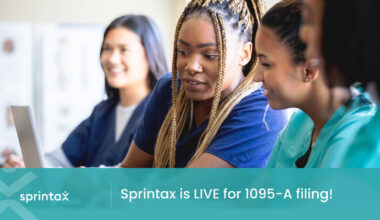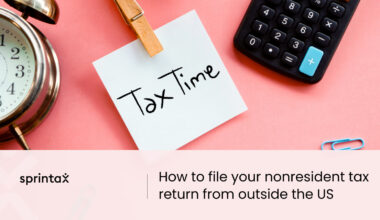(Last updated: 16 Apr 2025)
Each year, thousands of au pairs move to the US to live with host families.
We’ve put this handy guide together to fill you in on everything you need to know about foreign au pairs and tax in the US.
About the Au Pair Program
What is an au pair?
An au pair is an individual between the ages of 18 and 26, who travels from their home country to live in the US as part of the State Department cultural exchange program.
Au pairs live with an American host family, attend classes and provide limited childcare support to the family. The State Department sets forth comprehensive program regulations which every host family, au pair, and program sponsor are required to follow.
An au pair comes to the US as an Exchange Visitor on a J-1 visa that lasts for one year. Au pairs may be eligible to participate in an extension term if they meet all requirements to do so.
Participating in the au pair program is an unrivaled opportunity to experience the American way of life – and for those who are not native English speakers, it’s a chance to learn and practice the language.
You can find more about the au pair program here.
Au pair Income
Au pairs in America receive a weekly stipend (tied to the federal US minimum wage) from the host family. According to the Internal Revenue Service (IRS), the au pair stipend constitutes “wages”.
This means that Au pairs must report their stipend income to the IRS and it is subject to income tax.
One of the many challenges that an au pair may face when they arrive in the US is understanding the US tax system.

Residency for tax purposes
Au Pairs are generally deemed as nonresidents for tax purposes in the US.
However, if you have already been in the US for longer than 2 years, you will need to take the Substantial Presence Test to determine your residency for tax purposes.
You must know your residency for tax – filing incorrectly could lead to fines and penalties and affect future visa applications.
Do au pairs have to pay taxes?

In short, yes.
All payments that you have received as an au pair from your host family are subject to income tax.
As nonresidents, au pairs will owe tax on all of the money they earned from US sources.
In the United States, besides federal tax, there are also state taxes and local taxes. Whether you need to file a state tax return will depend on the tax rules of the state in which you lived and /or worked, as some states do not require you to pay state tax.
Because au pairs are paid for their work in a private home setting, they are not subject to mandatory US income tax withholding and reporting on Form 941 and W-2.
However, federal and state income taxes are due on an au pair’s whole income. If this tax was not deducted or paid during the year, it must be paid to the US tax authorities by the end of the year with the tax returns due.
What taxes are au pairs exempt from?
Au pair wages will be exempt from Social Security and Medicare (FICA) taxes because of the au pair’s status as a nonresident alien.
However, if you had previously been in the United States as a student, teacher, trainee, or researcher in F, J, M, or Q non-immigrant status, then you may be classed as a resident alien, meaning you may be subjected to these taxes.
Tax deductions for Au pairs
Most au pairs are considered nonresident aliens for tax purposes, so they can’t claim the standard or itemized deductions.
Au pairs are not eligible for:
- Lifetime Learning Credit
- Hope Credit
- Earned Income Tax Credit

Quarterly estimated tax payments
In order to reduce your tax liability during filing, the IRS permits au pairs to pay tax in quarterly instalments.
To do this, all you’ll need to do is submit Form 1040NR-ES (estimated tax return) to the IRS on a quarterly basis and enclose a cheque for the amount you are paying. You may also pay your tax in full at the end of the tax year with your 1040NR.
Sprintax Au Pair is designed to assist US Au Pairs in estimating their federal tax withholding and planning their IRS payment schedule.
Learn more about our Au pair tax calculator here.
Filing an income tax return
You will need to apply for a Social Security Number (SSN) or for an Individual Taxpayer Identification Number (ITIN), whichever is applicable in your case, in order to file your US Federal tax return.
You can prepare your au pair tax return with Sprintax.
Things to consider when filing as an Au Pair
Because Au Pair wages typically cover domestic services, they are still taxable but not subject to mandatory reporting on Form W-2, 1042-s etc.
This means that your wages are not exempt from tax and you are still required to file taxes.
You should always keep records of payments made to you by your host family, this will make tax filing easier down the line.
Even if you were paid in cash, you will need to report this income and pay the relevant taxes.
To help with this, Sprintax Returns software can allow you to enter the total Au Pair income paid to you during the tax year!
Au Pairs on J1 visas will not pay FICA taxes whilst they are a nonresident for tax purposes.

How to file my US tax return as an au pair
The deadline for filing 2024 federal tax returns is 15 April 2025.
In order to file your au pair tax return you need to:
- Obtain or find your Social Security Number (SSN) or Individual Taxpayer Identification Number (ITIN);
- Determine the total amount you received in payments from your host family to calculate how much you earned in the US during any part of the 2024 calendar year;
- File form 1040NR with the IRS;
- Send payment to the IRS with the amount of any taxes you owe.
At Sprintax, our software has the capabilities to help you e-file your federal tax return easily online. If required in the state(s) where you have been an au pair, we will also assist you in preparing your state tax return.
With Sprintax you can:
- Save time and stress!
- Determine your residency status
- Prepare a fully compliant US tax return, if necessary
- Maximize your State tax refund if available
- Avail of our 24/7 Vita Qualified Live Chat facility
Complete your au pair taxes hassle-free with Sprintax
I filed incorrectly! What should I do?
Firstly, don’t worry – plenty of nonresidents either forget to file or mistakenly file as residents each year.
The course of action you need to take depends on how you filed incorrectly.
For example, if you never filed, you can still backfile at any stage.
That’s right, it’s never too late to correct an error! Even if you made a mistake six years ago, as soon as you notice or are informed, correct it as soon as possible.
However, if you are due a tax refund, you can only claim back as far as three years from the due date of your original return.
If you forgot to file and owe tax to the IRS, you should file ASAP.
That is because the IRS will charge you fines for delays with your tax return, and the later you leave it, the bigger these fines will be.
They can also affect your future green card and visa applications.
If you mistakenly filed as a US resident, you will need to file Form 1040X and correct nonresident tax return 1040NR.
This form is similar to Form 1040.
You can find out more about what to do if you filed incorrectly here.
You can amend your tax return with Sprintax.
What happens if an au pair does not pay taxes?
It’s important to note that filing tax returns is required. By not filing your tax return, you can severely jeopardize your chances of securing a US visa or Green Card in the future.
How to pay taxes
If the case arises where you end up owing additional taxes along with your return, you have various options to pay. The most common forms of paying are pay by check, bank transfer, or credit or debit card.
You may need to prepare a payment voucher and mail it to the IRS with a check or money order if you choose this payment method.
If you choose to pay with a payment voucher, Sprintax will provide the filled out form for you. You will find detailed information about the method you have chosen in your instructions.
Check out this guide on what to do if you missed the tax deadline.
Complete your au pair tax return with Sprintax









